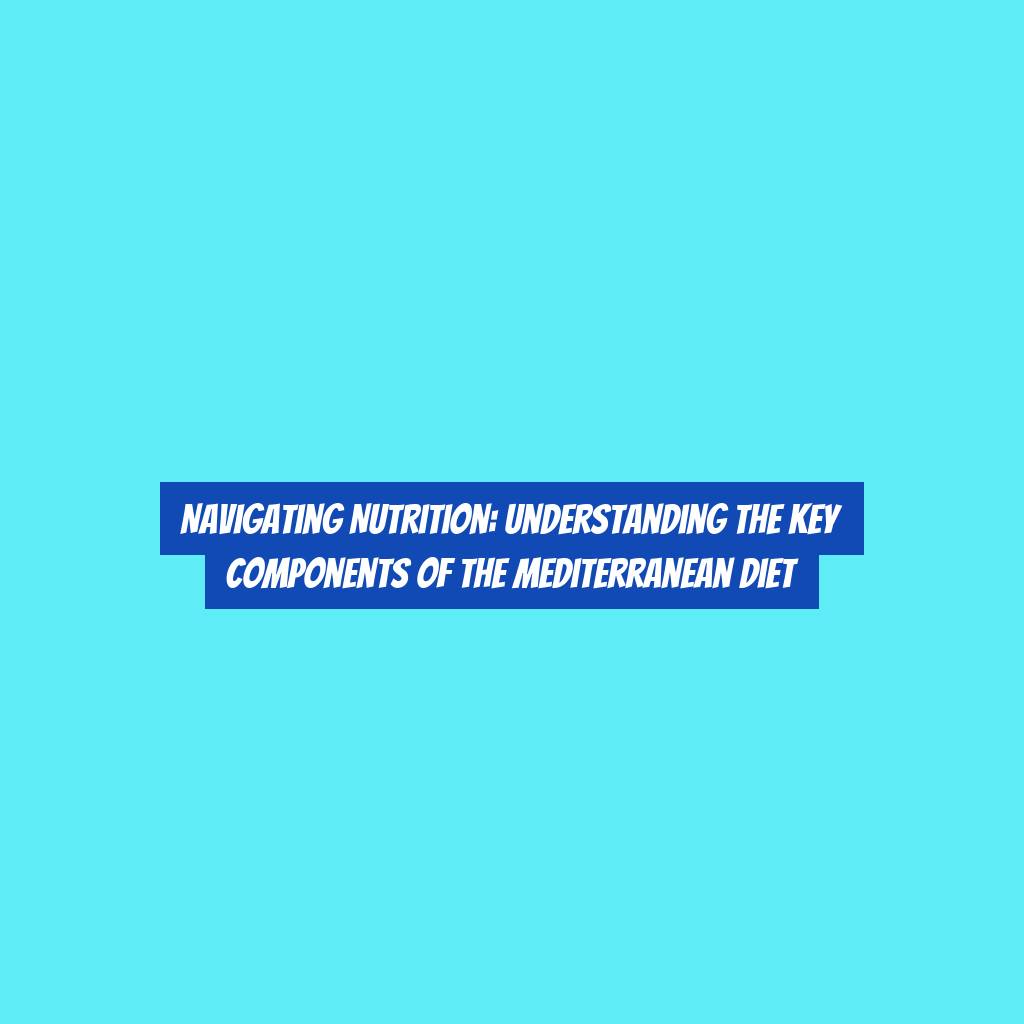Navigating Nutrition: Understanding the Key Components of the Mediterranean Diet
Embark on a journey through the rich and bountiful landscapes of the Mediterranean diet, where each bite tells a story of tradition, health, and vitality.
As you explore the key components of this time-honored way of eating, youG??ll uncover a tapestry of flavors, ingredients, and cultural practices that have captivated nutritionists and food enthusiasts alike.
But beyond the allure of its culinary delights, there lies a wealth of scientific evidence supporting its numerous health benefits, making it a compelling option for those seeking a balanced and sustainable approach to nutrition.
Origins of the Mediterranean Diet
The origins of the Mediterranean diet can be traced back to the traditional eating habits of people living in the Mediterranean region. This diet is deeply rooted in the culinary practices of countries such as Greece, Italy, and Spain, where fresh, locally sourced ingredients form the foundation of meals.
The Mediterranean diet emphasizes a high consumption of fruits, vegetables, whole grains, legumes, and healthy fats, particularly olive oil. Seafood and lean proteins are also integral components of this diet, while red meat is consumed in moderation. Additionally, the moderate consumption of red wine, often enjoyed during meals, is a notable characteristic of the Mediterranean diet.
The historical roots of this diet can be attributed to the agricultural and cultural practices of the Mediterranean region, where an abundance of fresh produce and seafood has long been available. The dietG??s emphasis on whole, unprocessed foods reflects the traditional approach to cooking and eating in these countries.
Moreover, the communal aspect of sharing meals with family and friends is a fundamental part of the Mediterranean diet, promoting not only nourishment but also social connection and overall well-being.
Core Food Groups
Emphasizing a high consumption of fruits, vegetables, whole grains, legumes, and healthy fats, particularly olive oil, the Mediterranean diet promotes a balanced and nutritious approach to eating. These core food groups form the foundation of the Mediterranean diet and provide a wide range of essential nutrients.
Fruits and vegetables are rich in vitamins, minerals, and antioxidants, while whole grains offer fiber and complex carbohydrates for sustained energy. Legumes such as beans, lentils, and chickpeas are excellent sources of plant-based protein and fiber, contributing to heart health and weight management. Healthy fats, especially olive oil, are central to the Mediterranean diet, providing monounsaturated fats that support heart health and reduce inflammation.
Incorporating these core food groups into your meals can help you maintain a healthy weight, lower your risk of chronic diseases, and improve overall well-being. By focusing on these nutrient-dense foods, you can enjoy a diverse and flavorful diet that nourishes your body and supports long-term health.
Benefits of the Mediterranean Diet
Now, letG??s explore the numerous benefits of embracing the Mediterranean diet, which can significantly enhance your overall health and well-being.
-
Heart Health: By focusing on healthy fats such as olive oil and omega-3 fatty acids from fish, the Mediterranean diet can help lower the risk of heart disease and stroke. The abundance of fruits, vegetables, and whole grains also provides essential nutrients and fiber that support a healthy heart.
-
Weight Management: Embracing the Mediterranean diet can aid in weight management and help prevent obesity. The emphasis on lean proteins, plant-based foods, and monounsaturated fats can contribute to feeling satisfied and full, reducing the likelihood of overeating.
-
Reduced Inflammation: The dietG??s rich array of antioxidants and anti-inflammatory foods, including fruits, vegetables, nuts, and oily fish, can help combat inflammation in the body. This can potentially reduce the risk of chronic diseases such as cancer, diabetes, and AlzheimerG??s.
Cooking Methods and Flavor Profiles
To enhance the flavor of your Mediterranean dishes, consider incorporating traditional cooking methods and flavor profiles that highlight the natural taste of fresh ingredients.
Start by using olive oil as the primary fat for cooking. Whether youG??re saut+?ing vegetables, grilling fish, or roasting meats, the use of olive oil not only adds a characteristic flavor but also contributes to the heart-healthy nature of the Mediterranean diet.
Another essential aspect of Mediterranean cooking is the emphasis on fresh herbs and spices. Incorporate ingredients like garlic, oregano, basil, and thyme to add depth and complexity to your dishes. Additionally, consider using citrus juices, such as lemon or orange, to brighten up flavors and add a refreshing twist.
When it comes to protein, grilling or broiling is a popular method that adds a smoky flavor without the need for excess oil or fat.
Finally, donG??t underestimate the power of simplicity. Let the natural flavors of your ingredients shine by using cooking methods that preserve their integrity, such as steaming or lightly seasoning with salt and pepper.
Tips for Incorporating the Mediterranean Diet
Consider incorporating the Mediterranean diet into your lifestyle by gradually introducing its key components and making simple substitutions in your meals. Here are some tips to help you seamlessly integrate the Mediterranean diet into your daily routine:
-
Start with Small Changes: Begin by incorporating more fruits, vegetables, whole grains, and legumes into your meals. For example, try adding a side salad with mixed greens, cucumbers, and tomatoes to your lunch or dinner.
-
Use Healthy Fats: Replace butter with heart-healthy olive oil when saut+?ing or roasting vegetables. You can also snack on a handful of nuts or seeds, such as almonds or pumpkin seeds, instead of reaching for processed snacks.
-
Experiment with Herbs and Spices: Enhance the flavor of your dishes by using fresh herbs and spices instead of salt. Try adding basil, oregano, rosemary, or thyme to your recipes for a burst of Mediterranean-inspired taste.
Conclusion
In conclusion, the Mediterranean diet offers a balanced and delicious approach to nutrition, with its emphasis on fresh fruits and vegetables, whole grains, lean proteins, and heart-healthy fats. By understanding the core food groups and cooking methods, you can easily incorporate this diet into your lifestyle.
The benefits of the Mediterranean diet are numerous, including improved heart health, weight management, and overall well-being. So, why not start enjoying the flavorful and healthful benefits of the Mediterranean diet today?


